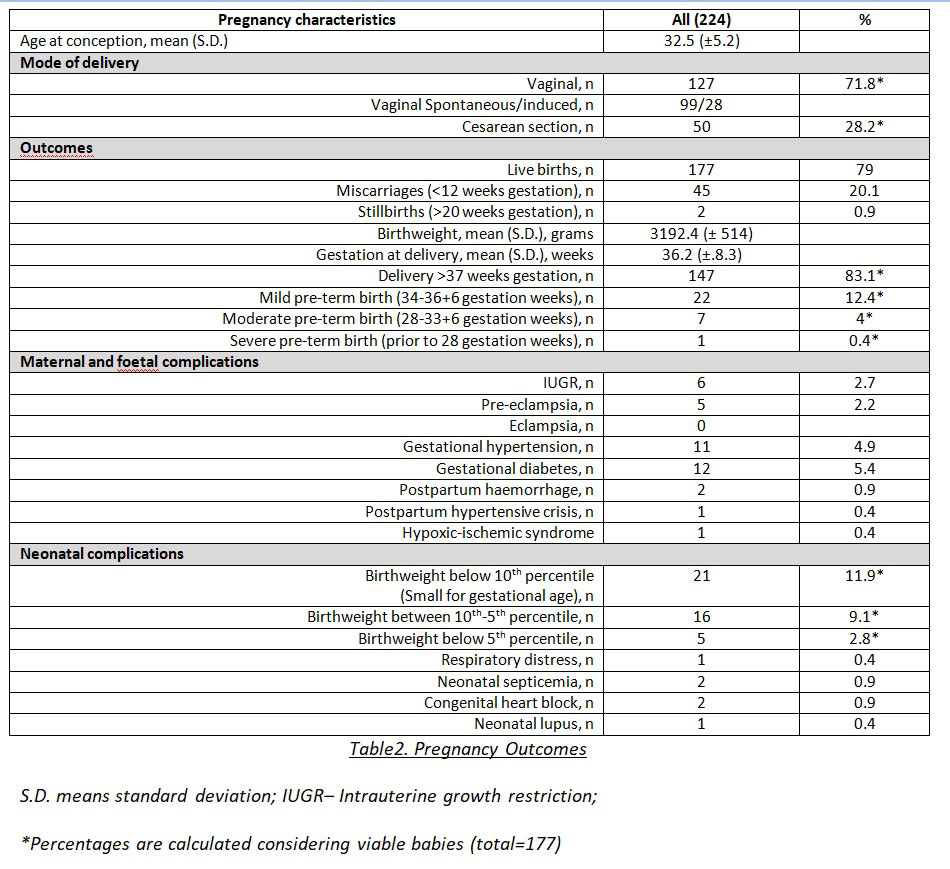Session Information
Session Type: Poster Session (Tuesday)
Session Time: 9:00AM-11:00AM
Background/Purpose: Undifferentiated connective tissue disease(UCTD) represents a common autoimmune condition in clinical practice, however, therapeutic strategies and follow-up are mostly based on clinician expertise. Little is known about the fetal and maternal pregnancy outcomes of women with UCTD. In this study, we aimed to investigate fetal/perinatal and maternal outcomes from a large multicentre cohort of women diagnosed with UCTD.
Methods: This multicenter study included patients diagnosed with UCTD ever pregnant, positive for antinuclear auto-antibodies and aged < 45 years old at study inclusion. Clinical data was collected retrospectively and complete laboratory profiles were assessed before conception, according to local standard of care adopted by all centers involved in the study.
Results: The study included a total of 133 women diagnosed with UCTD. Of the 224 pregnancies analysed,177 (79%) resulted in live births, 45 (20.1%) in miscarriages (defined as pregnancy loss before 12 weeks’ gestation), 2 (0.9%) in stillbirths (pregnancy loss after 20 weeks’ gestation) and six (2.7%) cases presented intrauterine growth restriction. Miscarriages and stillbirths were strongly associated with the presence of antiphospholipid antibodies (aPL) and extractable nuclear antigen antibodies (ENA).Maternal pregnancy complications were as follows: 5(2.2%) cases developed pre-eclampsia, 11 (4.9%) patients experienced gestational hypertension, and 12 (5.4%) women were diagnosed with gestational diabetes.
Joint involvement represented the most frequent clinical manifestation (57.9%), followed by Raynaud’s phenomenon (10.6%), photosensitivity (32.3%) and haematological manifestations (27.1%).
The rate of disease evolution of our cohort from a diagnosis of UCTD to a diagnosis of definite connective tissue disease (CTD) was 12% within a mean time of 5.3 years (S.D. ±2.8). With a total follow-up after first pregnancy of 1417 patient-years, we observed the evolution to a defined CTD in one for every 88 patient years. Demographic and diagnostic characteristics of the cohort are displayed in Table 1 and Table2 resumes pregnancy outcomes data.
Conclusion: Women with UCTD may warrant specialist follow-up when planning a pregnancy. ENA profiling and aPL testing should be mandatory in this setting, and further therapeutic approaches and management should be planned accordingly.
To cite this abstract in AMA style:
Radin M, Schreiber K, Cecchi I, Bortoluzzi A, Crisafulli F, De Freitas C, Bacco B, Rubini E, Foddai S, Padovan M, Gallo Cassarino S, Franceschini F, Andrade D, Benedetto C, Govoni M, Bertero T, Marozio L, Roccatello D, Andreoli L, Sciascia S. A Multicentre Study of 244 Pregnancies in Women with Undifferentiated Connective Tissue Disease: Foetal/Perinatal and Maternal Outcomes and Disease Evolution Towards a Definite Connective Tissue Disease [abstract]. Arthritis Rheumatol. 2019; 71 (suppl 10). https://acrabstracts.org/abstract/a-multicentre-study-of-244-pregnancies-in-women-with-undifferentiated-connective-tissue-disease-foetal-perinatal-and-maternal-outcomes-and-disease-evolution-towards-a-definite-connective-tissue-disea/. Accessed .« Back to 2019 ACR/ARP Annual Meeting
ACR Meeting Abstracts - https://acrabstracts.org/abstract/a-multicentre-study-of-244-pregnancies-in-women-with-undifferentiated-connective-tissue-disease-foetal-perinatal-and-maternal-outcomes-and-disease-evolution-towards-a-definite-connective-tissue-disea/



